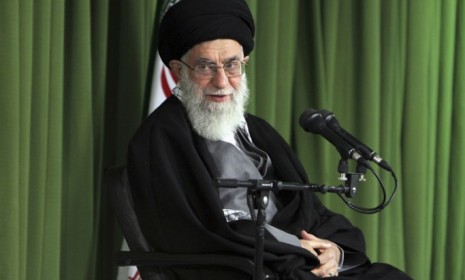Did foiled nuke inspections in Iran take us 'a big step closer to war'?
International experts are denied access to a military site suspected of harboring nuclear weapons research — and the consequences could be dire

A free daily email with the biggest news stories of the day – and the best features from TheWeek.com
You are now subscribed
Your newsletter sign-up was successful
United Nations nuclear experts left Iran "empty-handed" this week, after Tehran refused to let them visit a military site, Parchin, where scientists are believed to be researching nuclear-weapon technology. The extraordinary two-day visit by representatives from the International Atomic Energy Agency (IAEA) — the second in three weeks — had initially raised hopes of a breakthrough agreement to ease tensions over Iran's nuclear intentions. Instead, did it just make matters worse? Here, a brief guide:
What was the main sticking point?
Access to Parchin. Previous visits to the military site turned up nothing, but inspectors have since uncovered evidence that a steel vessel useful for developing a warhead had been delivered to Parchin. The nuclear experts asked to return to Parchin as a "litmus test" of Iran's willingness — and ability — to prove it's not working on nuclear weapons, says Julian Borger at Britain's Guardian. They were "thoroughly rebuffed."
The Week
Escape your echo chamber. Get the facts behind the news, plus analysis from multiple perspectives.

Sign up for The Week's Free Newsletters
From our morning news briefing to a weekly Good News Newsletter, get the best of The Week delivered directly to your inbox.
From our morning news briefing to a weekly Good News Newsletter, get the best of The Week delivered directly to your inbox.
Why did Iran block access to Parchin?
"We've got to assume the worst," a Defense Department officer tells TIME. Not so fast, says Teymoor Nabili at Aljazeera. Iran's agreement with the IAEA requires Tehran to let inspectors visit only nuclear sites. Officially, Parchin doesn't fit the bill. "Iran may have simply been sticking to the letter of the law and asserting some measure of sovereignty."
Will the IAEA visit raise tensions?
Absolutely, says Mark Thompson at TIME. "Like it or not, the world just moved a big step closer to war with Iran over its nuclear program." Now "the race is on" to see whether new sanctions on Iran's meal ticket — its oil exports — will make the ruling mullahs buckle before fighting breaks out. The West must resist the impulse to use this kind of Iranian intransigence as a rationale for war, says Seumas Milne at Britain's Guardian. "A U.S.-Israeli stealth war is already raging on the ground, including covert assassinations of scientists, cyber warfare, and attacks on military and missile installations." Launching a full-on shooting war would be an act of criminal, "destructive stupidity" — "guaranteed to trigger a regional conflagration with uncontrollable global consequences."
A free daily email with the biggest news stories of the day – and the best features from TheWeek.com